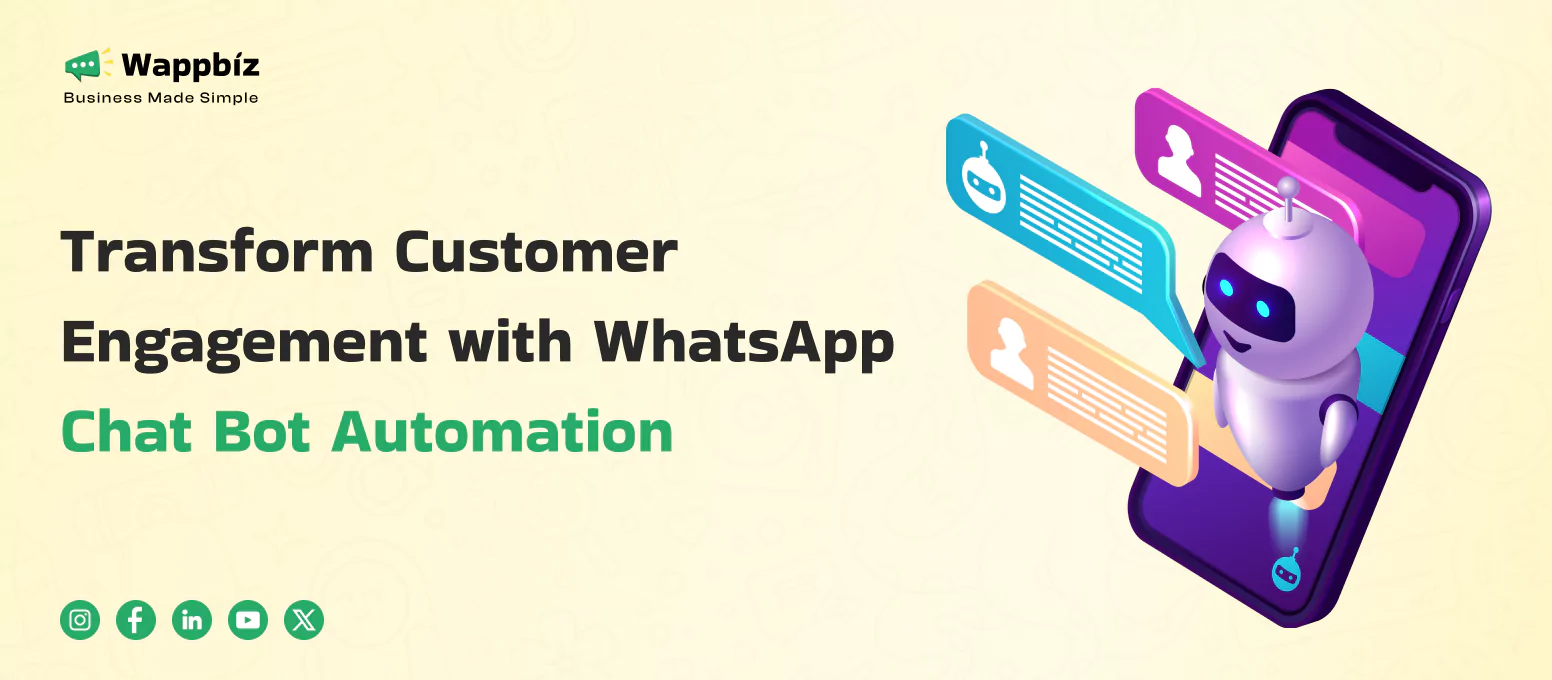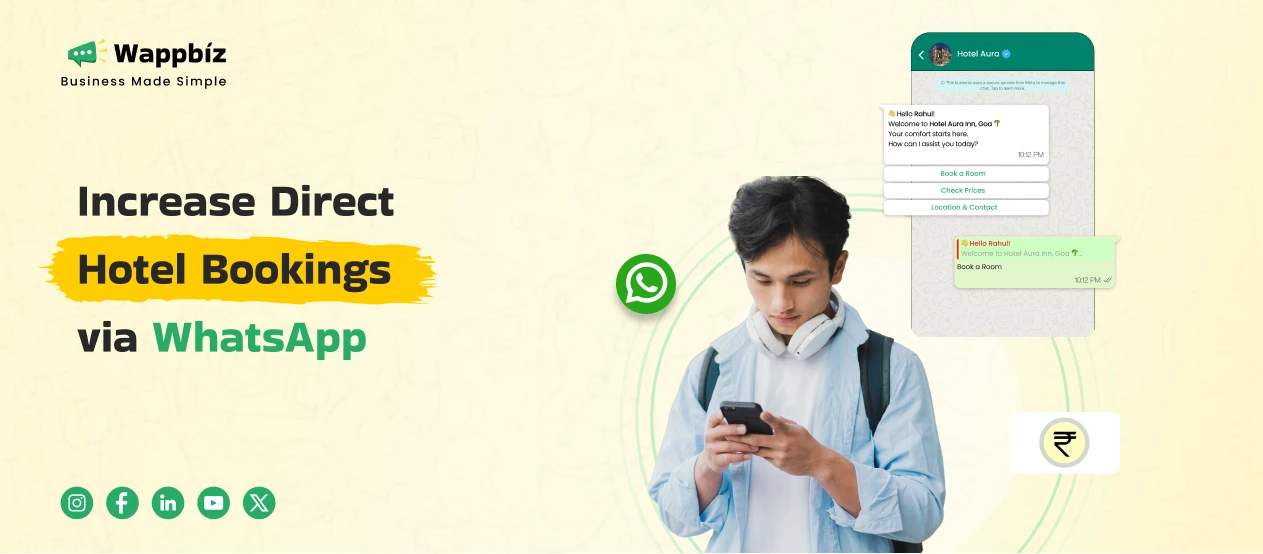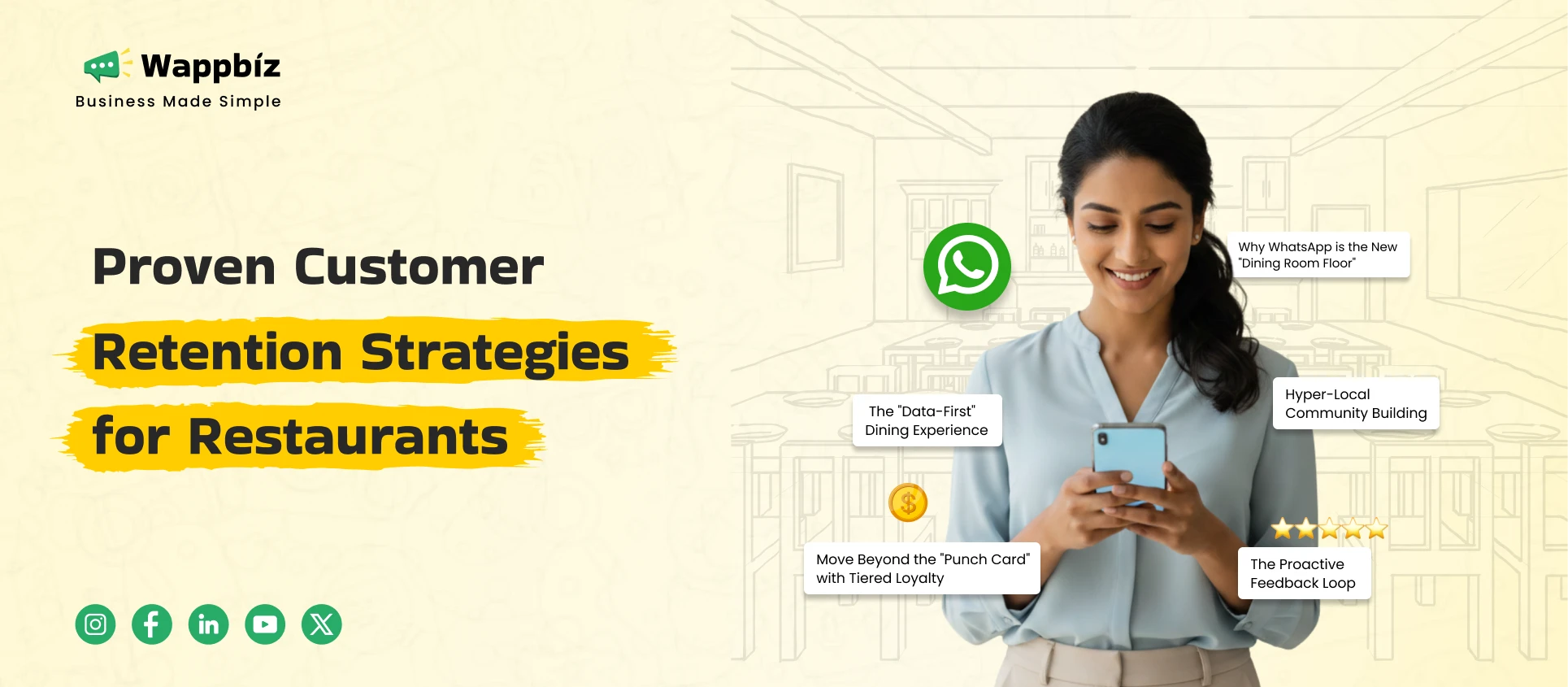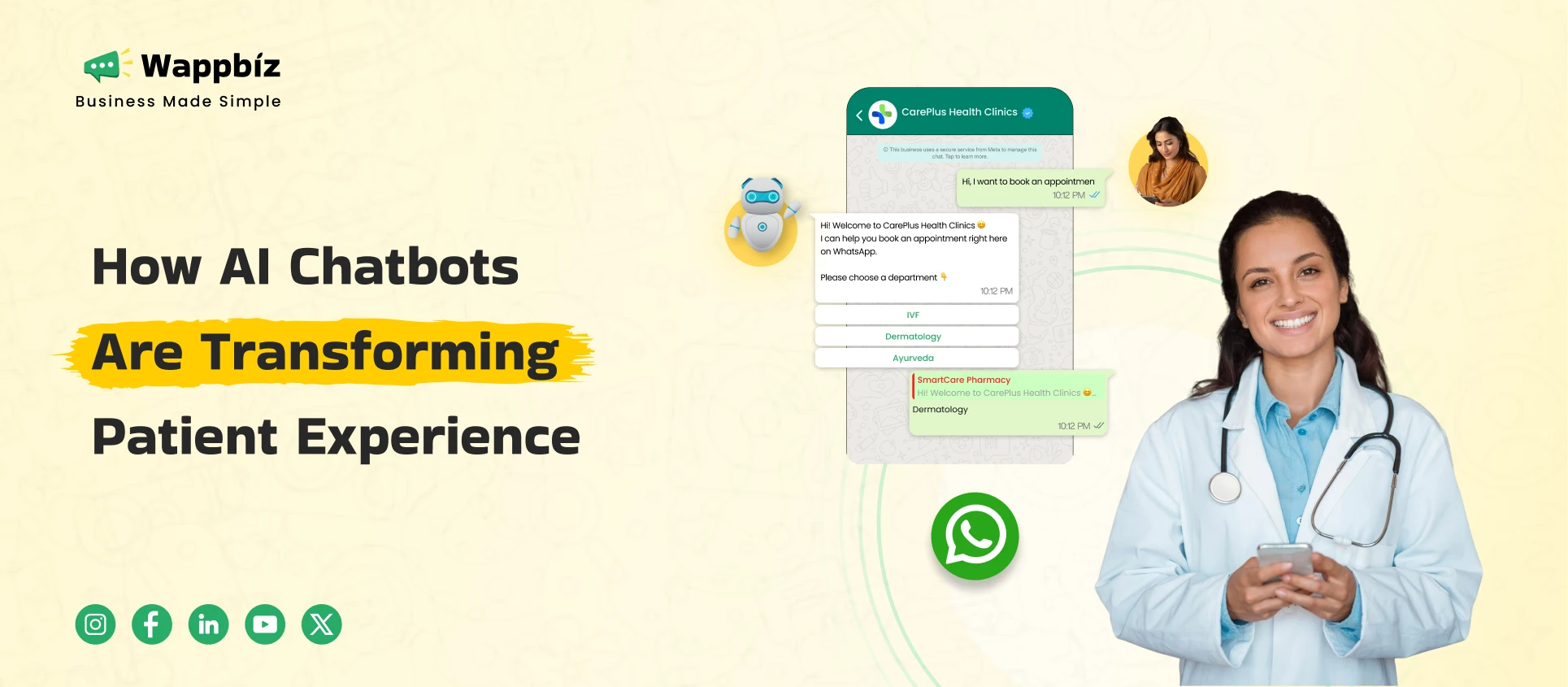In the rapidly evolving environment of today, businesses need to respond to the changing needs of customers. WhatsApp chatbot Automation is a powerful solution that keeps customers engaged 24/7, boosts sales, and streamlines operations. Using the power of WhatsApp, businesses can automate responses, generate leads, and deliver better customer service, all without human intervention.
What is Chatbot?
A chatbot is an AI-powered program to simulate human conversation. It communicates with users either by text or voice to help users get instant answers from the chatbot or to facilitate the completion of a task. A typical example of this would be quizzes on shopping sites. These would trace your order or perhaps answer product-related queries. Similarly, a banking site would probably show the account details, or you may make a transaction without speaking with a live agent. These, in themselves, are designed with the very purpose of making communication easy, quick, and effective.
What is Chatbot Automation?
The term “chatbot automation” refers to the practice of automating interactions with customers through computer programs powered by artificial intelligence (AI), most often used on websites, social media, or messaging systems like WhatsApp. Without human interaction, these chatbots can conduct common and repetitive tasks, including answering frequently asked questions, processing orders, scheduling appointments, and giving assistance.
Generally, chatbot automation is a crucial tool for contemporary consumer engagement since it improves productivity, saves time, decreases operational expenses, and guarantees that firms provide 24/7 service.
The Evolution of chatbot automation
From their first days of offering simple scripted responses, chatbots have evolved. Driven by artificial intelligence and natural language processing (NLP), today’s chatbots can grasp user intent, learn from past conversations, and respond in a human-like way. This development has resulted in chatbot automation, a method whereby intelligent bots handle time-consuming, repetitious customer care chores, freeing human agents to concentrate on more difficult problems.
Whether it’s helping users with account services in a banking app, providing instantaneous support on an e-commerce site, or booking patient medical appointments, chatbot automation provides quick, accurate assistance around the clock.
What is a WhatsApp Chatbot Automation?
WhatsApp Chatbot Automation is when a chatbot (a type of software) is used to automatically talk to customers on WhatsApp. These chatbots follow a set of rules to respond to questions, help with orders, and solve problems without needing a human to do everything.
Unlike traditional customer service, in which each query is handled by human agents, WhatsApp chatbots are able to automate repetitive tasks and respond to rapid base-level interactions, creating an opportunity for businesses to dedicate their human resources to more complex customer queries. This way, businesses are also able to provide uninterrupted customer support while ensuring that their staff members are not required to abandon their workstations just to engage with customers 24/7.
How WhatsApp Chatbots Work
WhatsApp chatbots work by automatically sending and receiving messages on WhatsApp. They are programmed with specific commands or trained to recognize customer inputs and provide the appropriate response.
For example, If a customer asks about a product, the chatbot can pull up information about the product, provide pricing details, and even guide the customer through the purchasing process.
8 Benefits of WhatsApp Chatbot Automation
There are lots of benefits of whatsapp bot automation for your business. Here are 8 advantages, with examples, illustrating how this can help your business thrive.
24/7 CUSTOMER SUPPORT
WhatsApp chatbots can provide 24/7 customer support, enabling businesses to help customers round the clock. No more waiting for you to be available to answer your customers’ questions.
Example:
An e-commerce store has a WhatsApp chatbot in place that helps to ensure customers questions about whether a product is available or tracking regarding the order or returns get answered 24X7 irrespective of the time, be it 2 AM or 2 PM.
Instant and Tailored Responses
WhatsApp chatbots respond instantly, providing instant info for customers. Chatbots can remember past conversations and details of customer preferences to personalize the interactions as well.
Example:
For example, a travel agency’s WhatsApp chatbot can suggest customized vacation packages based on the previous purchases or preferences of customers, making the experience uniquely tailored for them.
Efficiency and Cost Savings
Chatbots save businesses both time and money by automating mundane tasks such as receiving FAQs, qualifying leads, etc. That minimizes the need for sizeable customer support teams while letting human agents work on more sophisticated matters.
Example:
A telecom company’s WhatsApp chatbot can answer basic billing questions and data usage questions, freeing up customer service agents and reducing operating costs.
Increased Sales and Lead Generation
WhatsApp chatbots can generate leads and nurture them through personalized messages and follow-ups. By automating sales processes, chatbots can engage customers and drive them through the purchasing journey.
Example:
An online clothing store’s WhatsApp chatbot sends out personalized product recommendations and limited-time discount offers to potential customers, increasing sales and conversions.
Enhanced Customer Engagement
WhatsApp is one of the most popular messaging applications available, and reaching customers on this platform makes it most convenient and accessible for them. Chatbots can provide updates, reminders, and even promotions; thus they can ensure the customers are engaged, informed, and alerted.
Example:
A healthcare provider’s WhatsApp chatbot delivers appointment reminders, health tips, and follow-ups to ensure patients are receiving updates about and engaging with their health.
Automating Repetitive Tasks
WhatsApp chatbots help automate tasks like sending reminders and follow up with leads, as well as collecting feedback. Automation allows for time savings and uniformity between all interactions.
Example:
A real estate agency’s chatbot automatically follows up with property viewers, freeing agents up while minimizing the risk of losing leads.
Supporting Multiple Languages to Reach the World
International businesses can benefit by deploying WhatsApp chatbots that can communicate in multiple languages. This solution eliminates the language barriers and lets customers interact with the same experience anywhere in the world.
Example:
These multilingual applications were initiated by an international hotel chain that employed a WhatsApp chatbot to help guests communicate in their own tongue, increasing engagement and customer satisfaction.
Data Collection and Insights
WhatsApp chatbots dos even not only engage customers but also collect data. Analyzing its data allows businesses to better understand customer behavior, preferences, and pain points, and tailor their services, products, and marketing strategies accordingly.
Example:
One online subscription service listens in on conversations with its WhatsApp chatbot to pinpoint typical customer complaints to help them rectify offerings and better serve customers.
Important Systems to Integrate with WhatsApp Chatbot Automation.
CRM System
Partner CRMs can allow WhatsApp chatbots to access consumer profiles, purchase history, and previous interactions, enabling tailored responses. For example, if a customer asks a question about a product they have previously expressed interest in, the chatbot can provide them with personalized recommendations or offers.
Online shopping platforms
Why Chatbots and how they went to automate the consumer interactions directly by linking them to websites like Shopify or WooCommerce to track orders, check product availability, and even integrate PayPal for processing inside WhatsApp. The integration guarantees a seamless buying experience and helps companies manage inventory more accurately.
Payment Systems
And by integrating with payment channels such as Stripe or PayPal, businesses can deliver to WhatsApp a comprehensive shopping experience. The convenience is enhanced with secure payments made by consumers. One such example is the chatbot of a restaurant that can take orders and accept payments in one discussion.
Tools for Marketing Automation
Chatbots will likely talk to apps like Zapier to automate away such marketing tasks as surveys, feedback gathering, and messaging campaigns. This ensures that companies act on consumers’ at the right moment, which naturally increases conversion.
Scheduling Software
That’s why receiving automated bookings, reminders, and cancellations, especially for appointment-driven businesses like health care or beauty salons, takes the strain out of appointment maintenance by integrating with Calendly.
Key Benefits of Integrating WhatsApp Chatbots Automation
There are multiple benefits to integrating WhatsApp chatbots with other systems.
Improved Customer Experience: Chatbots offer personalized interactions tailored by accessing real-time information, hence loved by customers.
Some of them are Reducing Costs: Automation reduces operational costs. Automation of orders, payments, and follow-ups frees up human resources so that companies can focus on strategic tasks.
Anyone can send out an email and reply to it: This opens up integration with a few channels, but it is blended integration.
Scalability: Integrated chatbots easily scale as organizations expand, as they are capable of handling increased levels of engagement without compromising the quality of service.
Use cases: WhatsApp chatbots from various industries
- E-commerce: Cart Recovery and Order Confirmation Automation
For e-commerce stores, WhatsApp chatbots can send automatic messages to customers who have abandoned their shopping carts. Such messages might prompt them to finalize their purchase or provide a discount as an incentive for them to come back.
- Customer Support: Answering FAQs and Guiding Problems
Similar questions arise from many customers. You can automate these frequently asked questions via WhatsApp chatbot without a human agent. This provides your support team with time savings and serves your customers in getting answers faster.
- Marketing: Automated Campaigns for Lead Nurturing
WhatsApp chatbots can also send out automated marketing messages to reach potential customers, such as nurturing leads with valuable content, special offers, or product updates.
- Sales: Lead Qualification and Follow-Up Automation
WhatsApp click-to-chat widgets allow you to automatically qualify leads for sales teams and follow up with them. The chatbot can ask questions to assess the potential customer’s needs and then forward the qualified leads to a sales rep for follow-up.
Best WhatsApp Chatbot Tools to Look for in 2025
You can use WhatsApp chatbots to increase customer engagement and customer support for your business. There are a plethora of tools out there to help create these chatbots, making it simple for any business to automate your conversations. So here come the top WhatsApp chatbot tools of 2025.
WappBiz
WappBiz: It is a WhatsApp Business automation tool that enables businesses to create and manage their WhatsApp chatbot. It is a one-stop-solution platform, designed with the purpose of facilitating smoother communication between businesses and customers.
Key Features:
- Streamlines customer support and lead generation.
- Provides tools to design message flows and automate responses.
- Offers insights for monitoring customer engagement and campaign effectiveness.
Why Use It:
WappBiz is well suited for businesses who have basic needs of automating WhatsApp interaction as well as managing customer engagement with ease.
WATI
WATI (WhatsApp Team Inbox) is another fantastic WhatsApp automation tool especially made for teams to manage customer conversations. It is ideal to be used by customer service, marketing, and sales teams.
Key Features:
- Empowers teams to handle WhatsApp messages with a shared inbox.
- Enables you to generate automated responses for frequently asked questions.
- Assists in managing leads and following up automatically.
Why Use It:
WATI is great for businesses with teams that have to work on WhatsApp conversations collaboratively. It allows businesses to track customer inquiries and ensure no message is overlooked.
Landbot
Landbot is a no-code (no programming skills required) platform that allows you to build WhatsApp chatbots easily. It’s meant for businesses that want to build custom chatbots swiftly and simply.
Key Features:
- Chatbot designing using drag-and-drop interface
- It is code-free so that everybody can use it with ease.
- Integrations with WhatsApp as well as Facebook Messenger and website chat
Why Use It:
Landbot is ideal for fast, adaptable, and user- friendly chatbot builder for companies. It’s good for small businesses or teams without technical skills.
Engati
One such platform among the heaps is Engati, which provides a space for you to devise and maintain a WhatsApp chatbot for support functions, sales as well as marketing. It’s used globally by businesses large and small.
Key Features:
- Supported several messaging channels: WhatsApp, Facebook Messenger, and website chat.
- Chatbots powered by AI that learn and grow over time.
- Provides analytics and reporting tools to monitor and analyze the chatbot’s performance.
Why Use It:
For businesses looking for an AI-powered bot with multi-channel support, Engati is a great option. It is excellently suitable for both large and small businesses looking to automate their customer support or sales processes.
Conclusion
WhatsApp Chatbot Automation is a powerful tool for businesses looking to improve customer service, increase sales, and save time. With WhatsApp chatbots, businesses can provide 24/7 support, answer questions instantly, and automate repetitive tasks like order tracking and lead generation.
By automating these processes, businesses can focus more on complex tasks, reduce costs, and provide faster, personalized service to their customers. Chatbots can also help businesses scale by managing multiple customer interactions at once without sacrificing service quality.
With the right tools, such as WappBiz, WATI, Landbot, and Engati, creating and managing WhatsApp chatbots has never been easier. These platforms help businesses automate conversations, improve customer engagement, and grow efficiently.
In today’s competitive world, using WhatsApp Chatbot Automation can give your business a big advantage by ensuring your customers always get the help they need, anytime and anywhere.

FAQ’s
1. How do you make an automated chatbot?
- Steps:
- Choose a Platform: Use tools Wappbiz
- Design Chat Flow: Create the conversation flow with predefined responses.
- Connect to Business Channels: Link it to platforms like WhatsApp or your website.
- Test and Launch: Ensure smooth interactions and make adjustments as needed before going live.
2. What is an automation bot?
- An automation bot is a virtual assistant programmed to handle repetitive tasks automatically, such as answering FAQs, sending reminders, or processing orders. It works based on triggers, enhancing efficiency for businesses.
3. Is AI chatbot free?
- Some platforms offer free versions with basic features. However, advanced capabilities like analytics, customization, and multi-channel integration often require subscription plans (e.g., Wappbiz).
4. Can I run my own chatbot?
- Yes, you can! Platforms like Wappbiz allow you to create and run a chatbot without coding. Just define the responses, set the chat flow, and connect it to your preferred channels like WhatsApp or your website.
5. What is bot vs. AI?
- A bot automates tasks using predefined rules or scripts (e.g., answering FAQs).
- AI (artificial intelligence) uses technologies like machine learning to understand user input and respond intelligently, making it more adaptive and capable of handling complex conversations.
6. Are automated bots illegal?
No, automated bots are legal when used appropriately for tasks like customer service and business automation. Issues arise when bots are used for spam, scams, or activities violating privacy laws. Always ensure your bot complies with legal regulations.







